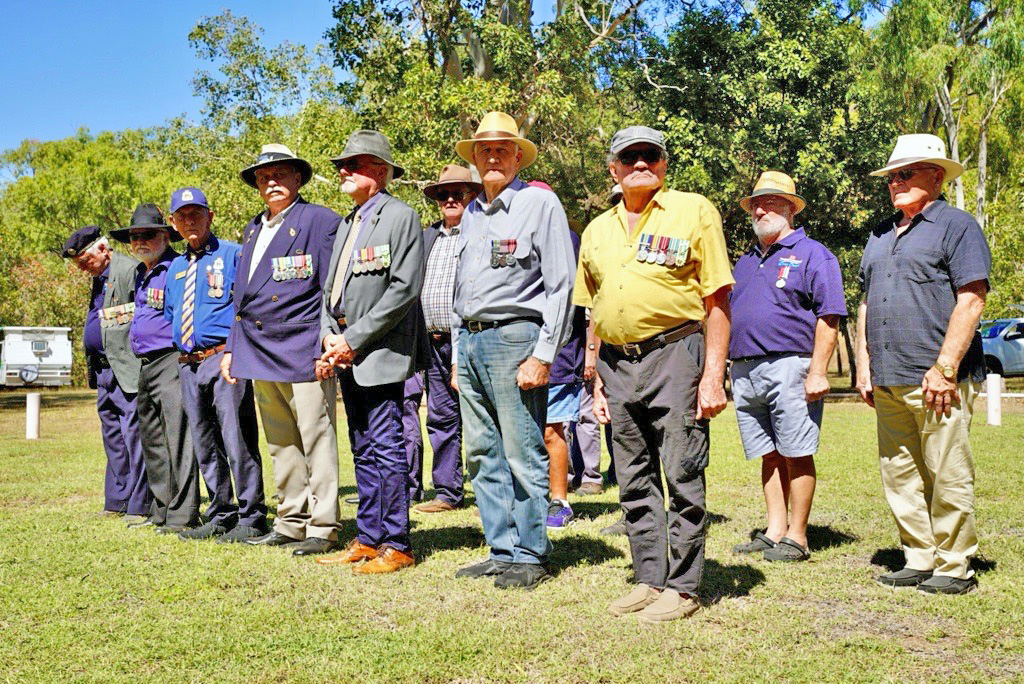
Marking 59th Anniversary of the Battle of Long Tan At Creek Veterans Retreat On Monday, 18 August, locals, dignitaries and veterans gathered at the Deep Creek Veterans Retreat in Ayr to mark the 59th anniversary of the Battle of Long Tan. Commencing at 11 am, the annual parade commemorated the 1966 battle in Vietnam—one of the key engagements involving Australian forces during the Vietnam War—honouring past veterans with a wreath-laying service, the playing of the Last Post and Reveille, and a
Read the full story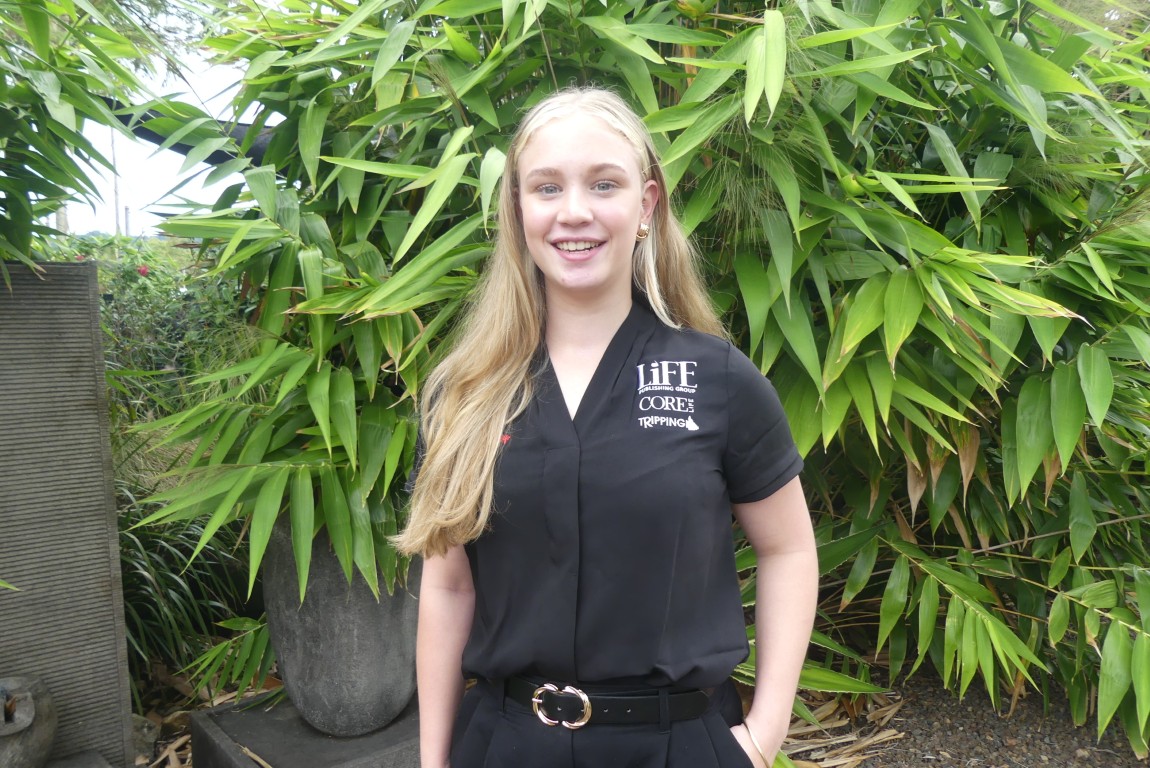
Burdekin Water Festival (BWF) Senior Ambassador representing CORES QLD, Mia Galbraith, has taken it upon herself to run a Self Love Night to raise awareness for the importance of mental health and valuable funds for the invaluable work of CORES QLD. In the lead up to this weekend’s event, Mia has shared several videos and posts online, detailing how important it is to take care of and prioritise your own personal mental health, featuring BWF Committee members as guests on occasion to encourage
Read the full story
Hi Everyone, It’s great to be back and feeling refreshed after a two-week holiday in Italy with my family. We stayed in a tiny village called Radicondoli, about three hours north of Rome, with a population of just 950! Our days were spent poolside, playing card games, and wandering into the village for fresh bread in the mornings and a glass of wine (or two!) in the evenings. It was my second time in Italy—my first visit was in my early twenties—and I’ve fallen in love with the country all ov
Read the full story
Burdekin cane farmers will have the opportunity to contribute in person to an inquiry aimed at growing the industry following the announcement of a public hearing in Townsville. Announced in June, Member for Burdekin, Dale Last MP urged local growers to embrace the opportunity and provide much needed input. “When the inquiry was announced, a commitment was given to dig deep into a wide range of issues affecting the industry,” Mr Last said. “A thorough investigation is necessary to ensure
Read the full story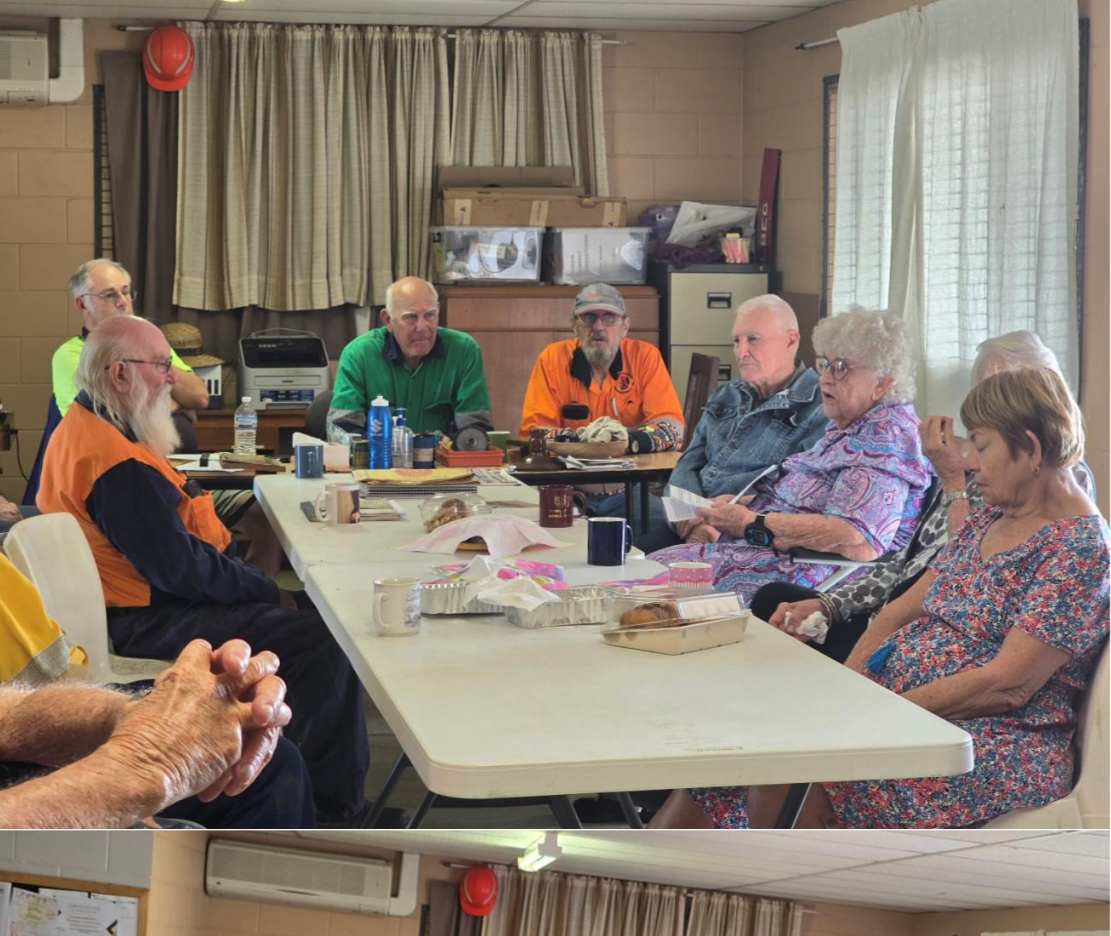
The Lower Burdekin Historical Society was inaugurated on 15 November 1967 with approximately 80 members from Ayr and Home Hill. Inaugural committee members included Bill and Isobel Cislowski, John Hawkins, Robert Collins, Ray Menkens, Allan and Jess Ey, J. Bessel, Ray and Margaret Conley, and Sandra Cameron.
The Society researched the history of the Lower Burdekin, from early exploration and settlement in the 1860s to the establishment of industry and business. Wherever possible, members visited both nearby and remote areas, marking and recording historical sites and milestones. Among the many locations documented were the MacMillan Bridge between Millaroo and Dalbeg, Airville School and the James Morrill Memorial Stone, Airdmillan Mill on Burstall Road, Inkerman Station’s centenary site, Plantation Creek Wharf, Airdmillan and Barratta Wharf, lone graves at Clare, the Burdekin’s original river-road crossing and Telegraph Station, Ayr Railway Station, Inkerman Bridge, Home Hill Courthouse, Post Office and Railway Station, the first Home Hill Cemetery, and Cape Upstart during bicentenary celebrations.
The Society’s extensive photographic collection is now housed at the Burdekin Library. In 2004, a display at the Power Station Museum in Home Hill recognised the Inkerman Irrigation Scheme and Power House. In 2007, the Bridging the Gap display and book commemorated the jubilee of the Burdekin High Level Bridge, and in 2015 the centenary of Home Hill was celebrated with an exhibition. These efforts were made possible through the tireless work of members including Graeme Haller, Herb Lennox, Jim and Jewel Gist, Jan Wallace, Loretta Liessmann, and others.
The Burdekin Shire History: Black Snow and Liquid Gold by historian John D. Kerr was compiled with assistance from Society members. John Drysdale’s Dream and Mastering the Dream, written by Laura A. Scott, marked the centenary of Home Hill. Laura Scott and Glenis Cislowski also contributed significantly to recording and sharing the region’s history through the local media—an endeavour Glenis continues to this day.
The Society’s most recent active members included Kevin “Rusty” Armstrong, Doreen and Arthur Berryman, Harold and Glenis Cislowski, Jim and Jewel Gist, Graeme Haller, John Hawkins, Herb Lennox, Loretta Liessmann, Trina List, Ray and Rosemary Menkens, Roy and Karen Page, Blair and Laura Scott, Don Thomson, and Bill and Jan Wallace.
The Lower Burdekin Historical Society Inc. was officially disbanded on 30 June 2023. At that time, it was resolved that the Society’s remaining funds should stay within the Burdekin. In recognition of the Burdekin Machinery Preservationists' ongoing work, these funds were donated to the organisation.
The decision to contribute $8000 towards the display of the Inkerman No. 1 locomotive stands as a fitting legacy for the Society. On Monday 7 July, Bruce Munro, President of the Burdekin Machinery Preservationists, gratefully accepted the donation from former Society secretary Laura Scott and president Trina List. Members and guests enjoyed a morning tea at the Brandon Historic Precinct to mark the occasion.
Contributed with thanks to Fiona Scott

High-visibility, proactive policing has put the squeeze on serious repeat offenders across Queensland and resulted in more than 250 offenders being charged with almost 400 crimes in 20 days.
Former Police Officer and Member for Burdekin, Dale Last MP, said Operation Marshall was already delivering results; a fact that highlighted missed opportunities over the last decade that could have resulted in fewer crimes and fewer victims.
“Operation Marshall is a $31 Million investment in tackling crime focussed on enabling Police to be proactive rather than waiting for crime to be committed,” Mr Last said. “I know, from experience, that those proactive activities, especially when they are high visibility, deters crime and allows us to deliver a zero-tolerance approach to repeat offenders.”
“Over the last few years of the previous government we saw the number of offenders who became repeat offenders increase year on year. That happened because there were no consequences for their actions and because the Police service wasn’t resourced to disrupt and deter.”
“Turning around the results of 10 years of weakened laws is not something you achieve overnight, as much as I wish we could. With tougher laws, improved early intervention and rehabilitation, and a boosted Police presence, we’ve drawn a line in the sand on a decade-long youth crime crisis.”
“There is no better deterrent for crime than a visible Police presence and that is what we are delivering. The former government refused to resource our Police to be proactive and, if they had, it’s most likely that we would have seen far less crime and far fewer victims.”
Mr Last said the success of proactive policing was not only proven by history but was also a key part of the recently completed 100-day review undertaken by the Police Commissioner.
“The Police Commissioner began the review under the former government and sought feedback from more than 500 frontline officers,” he said. “The review isn’t a political document, it’s a ‘warts and all’ look into achieving the best outcomes for Police and for our communities.”
“To say that the thin blue line was becoming thinner is an understatement. Police numbers were effectively going backwards and that makes being proactive and cracking down on repeat offenders almost impossible.”
“The Crisafulli government’s priority is about boosting boots on the ground, especially where they can have the biggest impact, and resourcing our Police properly. Early intervention and rehabilitation are available but, when it comes to serious repeat offenders, we need Police officers to hold them to account and that is what we are delivering.”
“We promised Queenslanders that we would improve safety, and we will do that by resourcing the services that we rely on to deter and respond to crime across the state. Queenslanders have the right to feel safe regardless of where they live, whether it’s the cities or smaller communities like the Burdekin.”
“This government has, and will continue to, deliver the funding and resources needed to put an end to the youth crime crisis for once and for all.”
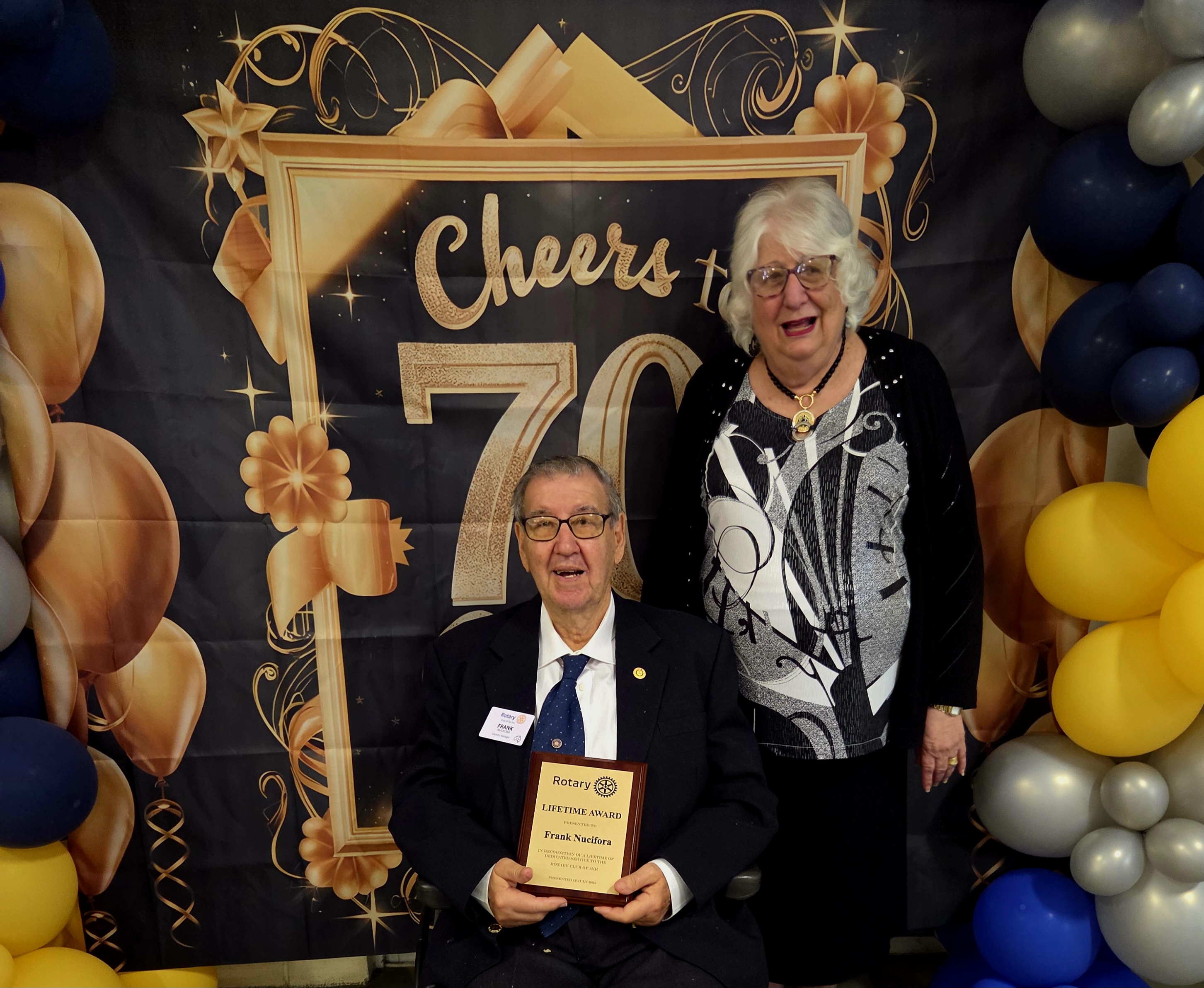
Ayr, QLD — Community spirit was front and centre on Saturday, July 12, 2025, as the Rotary Club of Ayr commemorated its 70th anniversary with an evening of pride, gratitude, and reflection.
Held at the Showgrounds Hall, the event brought together past and present Rotarians, dignitaries, Representatives from Rotary Clubs from Home Hill, Townsville, and Bundaberg, along with friends of the club and community members to honour seven decades of service. The evening’s theme was clear: celebrating the people and projects that have shaped Ayr’s Rotary legacy.
One of the most poignant moments of the night came during the presentation of the Lifetime Award to Mr. Frank Nucifora, recognising nearly 60 years of unwavering dedication and commitment to Community Service. A member since 1966, Frank’s contribution spans generations—his leadership, generosity, and quiet strength have left an indelible mark on both the club and the wider community.
“Frank embodies everything Rotary stands for,” said Past District Governor and past Club President Tony Goddard. “His service isn't measured just in years—but in lives touched, projects led, and values lived every day. This award is a symbol of our deepest respect and admiration.”
Frank along with past members of the Rotary Club of Ayr, has been instrumental in many landmark projects, including the Meals on Wheels initiative, transforming of Plantation Park into a much-used meeting place, contributing to the development of the Living Lagoon in the Theatre Forecourt and involvement in international outreach through Rotary’s humanitarian programs.
Guests also revisited the club’s unique bond with its namesake in Ayr, Scotland—formed when wartime food parcels mistakenly arrived across the globe, inspiring the gift of a historic reading desk made from the Auld Brig of Ayr. That desk still holds pride of place at the club’s weekly meetings.
With over $1.2 million donated since 1955, the Rotary Club of Ayr continues to champion local causes, from hospitals and schools to disaster relief and mental health support. International efforts, such as Polio Plus, ShelterBox, and Interplast, remain pillars of its global engagement.
As the evening drew to a close, Rotarians raised a toast not only to the club’s past but to the road ahead. To quote the pledge that is recited at weekly meetings “Let us practice the high principles of Rotary for the betterment of our Burdekin Community, our State, Queensland, our Nation Australia, the world and all it’s peoples”.
For more information about the Rotary Club of Ayr or to get involved: Email: ayr@rotary9560.org.au
Contributed with thanks to Narelle Hibberd.
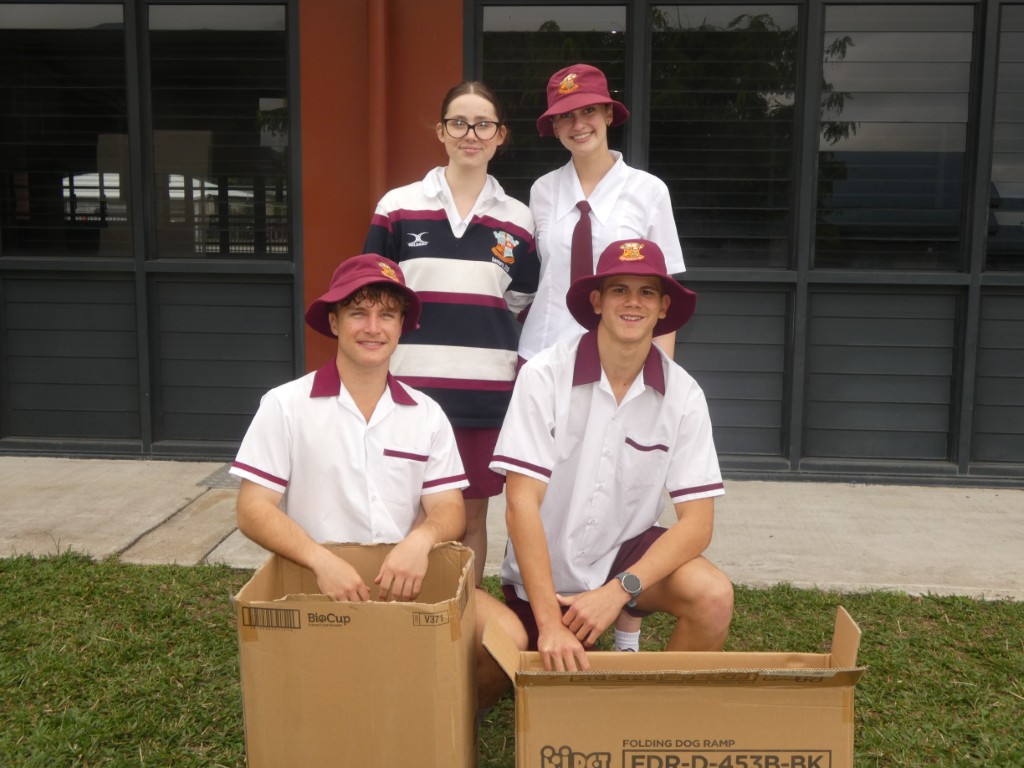
Homelessness isn’t just a big-city problem. It’s happening right here in the Burdekin, and Burdekin Catholic High School (BCHS) leaders, together with the Shire Youth Council, are stepping up to help support those most affected.
They’re doing so through the inaugural Stand Up, Sleep Out—Youth Against Homelessness event, to be held on Friday, 8 August 2025, during National Homelessness Week. The event will see students and community members sleep rough for a night in solidarity with those without secure housing. Inspired by the well-known Vinnies CEO Sleepout, participants will swap comfort for cardboard, raising funds and awareness for the Burdekin Community Association (BCA).
Continued on page 6
Youth Leading The Charge
The Stand Up, Sleep Out initiative was conceptualised when Year 12 BCHS leaders Harrison Lammon, Drea Piotto, Nicholas Pengelly and Piper Grogan were tasked with identifying local issues during their leadership interviews. After zeroing in on homelessness and receiving strong encouragement from Burdekin Shire Council Mayor Pierina Dalle Cort, they brought the idea to fruition.
“We thought, ‘we always see the CEO Sleepouts in Brisbane and everything, but why are we not seeing it in our small towns?’ We saw that gap and thought something needed to be done,” said Piotto.
The students emphasised that homelessness is a largely hidden but serious issue in the Burdekin. “There’s a lot of it in the Burdekin that not everyone sees,” said Grogan.
Lammon and Pengelly echoed this, noting the surprising scale locally and the need to raise awareness.
“I didn’t realise how big it is here. You think just the bigger cities have it, but here we’ve got hundreds of people suffering,” added Lammon.
“This is why we’re doing it—it’s about raising awareness, because not a lot of people know it’s happening,” explained Pengelly.
The process of planning the sleep-out has served as an eye-opener for the student leaders.
“Obviously, we've had to sacrifice a lot of our time to plan this,” Piotto said. “But you're always reminded that there's someone out there who's suffering worse than you. This is just a small sacrifice.”
The Burdekin Community Association’s recent report shows 538 people experienced homelessness locally last year, with hundreds more at risk. Women escaping domestic violence make up the largest group.
“Homelessness is never a choice,” said Grogan. “A lot of people see homeless people and are very judgmental… but it’s not really [the homeless person’s] fault.”
The Stand Up Sleep Out is expected to draw around 200 participants, with activities including budgeting challenges, a soup kitchen-style meal, crocheting items to donate, and a reflective walk. Funds raised will go directly to the BCA to purchase tents and essential supplies for those without safe housing.
Burdekin Shire Youth Mayor Nicole Cervoni said the event is a crucial opportunity for the region to face the reality of housing insecurity in rural communities.
“Homelessness in rural communities is a serious issue that often goes unnoticed,” she said. “Rural homelessness is real, and it needs our attention.”
Community members can support the event by registering to sleep out, donating non-perishable food, toiletries, blankets or making a financial contribution. To get involved, contact BCHS on (07) 4783 2366, Burdekin Shire Council’s Community Development Team on (07) 4783 9800 or reach out via Burdekin Shire Youth Council’s Facebook Page.
BCHS school leaders addressing the audience at the most recent industry breakfast.
Burdekin Shire Council Mayor Pierina Dalle Cort has voiced her full support of the BCHS Stand Up, Sleep Out initiative.
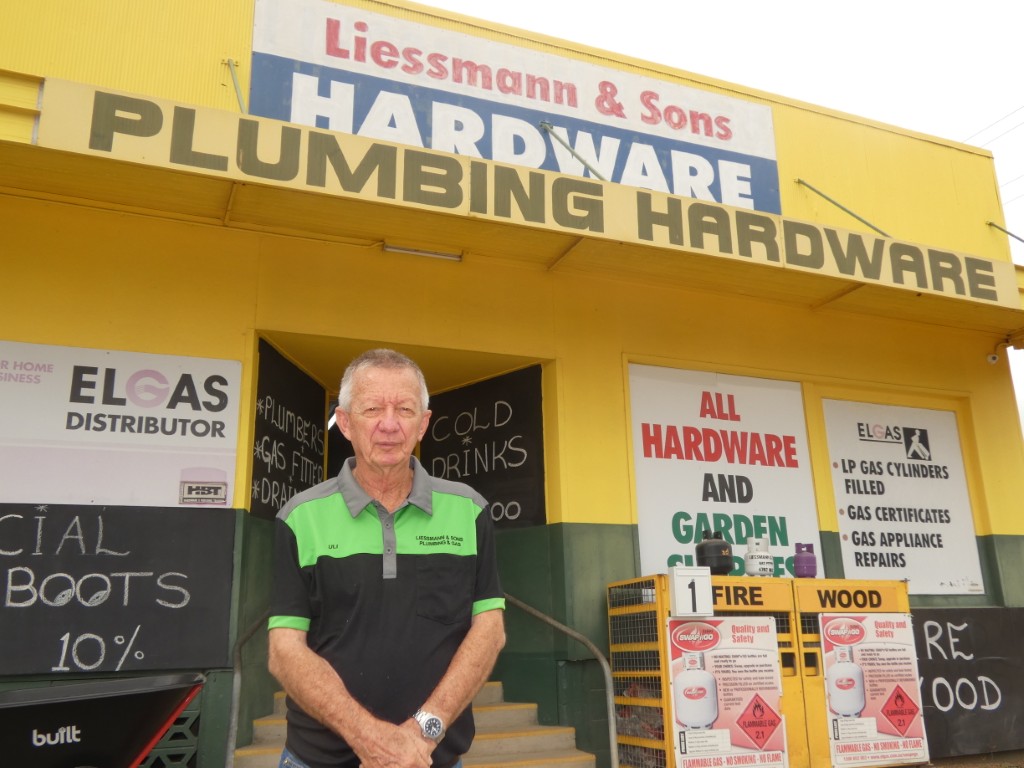
For more than half a century, Liessmann & Sons Plumbing and Gas has been a Burdekin mainstay, evolving from a modest one‑truck plumbing operation into a comprehensive, full‑service plumbing and gas provider.
Over the years, LP and commercial gases have become a core focus of the operation. What once began with the occasional cylinder now accounts for half the business, with gas services stretching from Giru to Bowen and all areas in between. The company employs qualified gasfitter, and the workshop has the capability to fabricate specialised parts on demand.
The company’s “no‑job‑too‑big” philosophy remains unchanged. With two registered builders on staff, Liessmann & Sons can take on everything from small repairs to complete bathroom renovations. This versatility has been key to keeping pace with a constantly changing industry.
The business has seen the trade transform dramatically over the decades. Where once heavy galvanised tanks, toolboxes, and custom metalwork were the norm, today’s materials are largely plastic made externally ready for use. These changes have brought new efficiencies, allowing the team to complete work that once took a week in just a day, without compromising on quality.
Central to the company’s longevity is its emphasis on friendly, efficient service. With 16 employees in the field and a three‑member office team, Liessmann & Sons remains a one‑stop shop for plumbing, gas, and even the occasional friendly chat. Many customers drop by simply to catch up, reflecting the business’s enduring place in the community.
That collaborative approach extends beyond customers, with the company maintaining strong working relationships with other local plumbers and tradespeople. In a competitive industry, the spirit of cooperation has fostered a network that benefits both workers and the wider Burdekin community.
Today, Liessmann & Sons continues to focus on what has always worked: adapting to change, maintaining high standards, and serving the people of the Burdekin with the same reliability that has defined the business for 55 years.
For more than half a century, Liessmann & Son’s Plumbing and Gas has been a fixture in the Burdekin. Photo credit: Jacob Casha
.jpg)
It’s been a busy start to Term 3 with students returning to classrooms and Council projects progressing across the Shire.
This week, I’d like to shine a light on Burdekin Catholic High School leaders alongside the Burdekin Shire Youth Council, who are collecting donations for the upcoming Stand Up Sleep Out – Youth Against Homelessness event on Friday 8 August.
This initiative, held during National Homelessness Week, gives people the chance to show solidarity with those facing housing insecurity in our region. I’m incredibly proud of our young community members for driving such an important conversation in our community.
I’m proud to be sleeping out in support of this important cause and encourage our community to get behind it. Anyone can take part by simply registering and paying the participation fee.
As part of the event, the community is encouraged to donate non-perishable food items, toiletries, sanitary items, pillows, blankets, and other sleep essentials to support those in need.
Donations can be dropped off between Monday 21 July and Friday 2 August 2025 at the Burdekin Shire Council Chambers, Burdekin Library, Home Hill Library, BCA, and the Burdekin Neighbourhood Centre.
Monetary donations can also be made by contacting Burdekin Catholic High School on 4783 2366 or by dropping the money into the tins located at the donation points above.
Should you wish to reach out, don’t hesitate to contact me directly by phone at 0447 150 582, or feel free to send an email to mayor@burdekin.qld.gov.au.
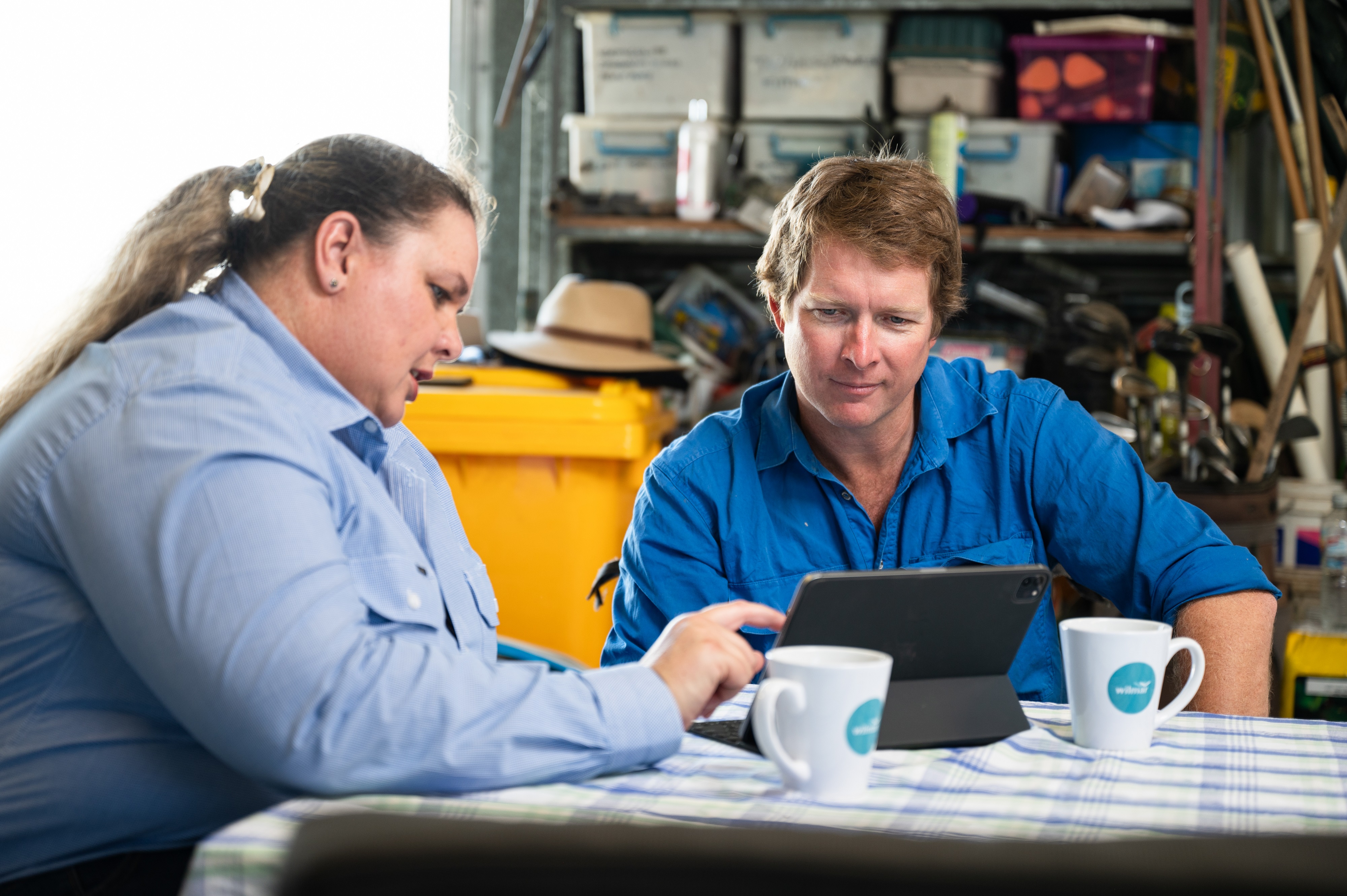
Every grower has a different way of handling their GEI sugar price exposure, which affects their final cane price. Some like to keep a close eye on the market, while others prefer a hands-off approach.
We offer a range of pricing options so growers can choose what suits their level of interest and their risk appetite.
We recommend thinking about sugar pricing as a form of risk management. If you're using Target Pricing, it means selling in small steps as the price improves, with the aim of locking in a solid average price over time.
Another pricing option we recently introduced is our Managed Pool Plus. This is an actively managed pool that includes both miller and grower sugar price exposure. Our goal is to outperform the market across the life of the pool. Despite a tough market, the 2025 pool is holding up well.
Due to increased enquiry from growers, we have extended the nomination deadline for the 2026 Season Managed Pool Plus until 31 July. That means there’s still time to allocate some of your 2026 GEI sugar exposure.
We created this pool to help reduce some of the stress around pricing decisions. Some growers dip their toe in by allocating just 10% to see how we perform. Others have put a greater share into the pool. A popular strategy is to split your exposure into thirds – one third into MPP, another third managed through Target Pricing, and the final third left until April to decide between the Production Risk Pool or our Grower Managed Production Risk Scheme.
If you’re not sure how the Managed Pool Plus could work for you, we can help. Our Grower Marketing team can compare different approaches, show how prices have moved, and talk you through possible outcomes under various market conditions. We can also check on any active orders you have and share the latest updates from our global market analysts.
Right now, the market is sitting tight, waiting on more solid data before making any big shifts. Brazil is still the country to watch. Its sugarcane crush is running 15% behind last year. They’re pushing hard on sugar production (over 53% of the crush), but the quality of cane – particularly the sugar content (ATR) – is down more than 5% on last year. That’s a big deal, and something the market is watching closely.
Our Grower Marketing consultants can compare different pricing approaches and talk you through
different possible outcomes
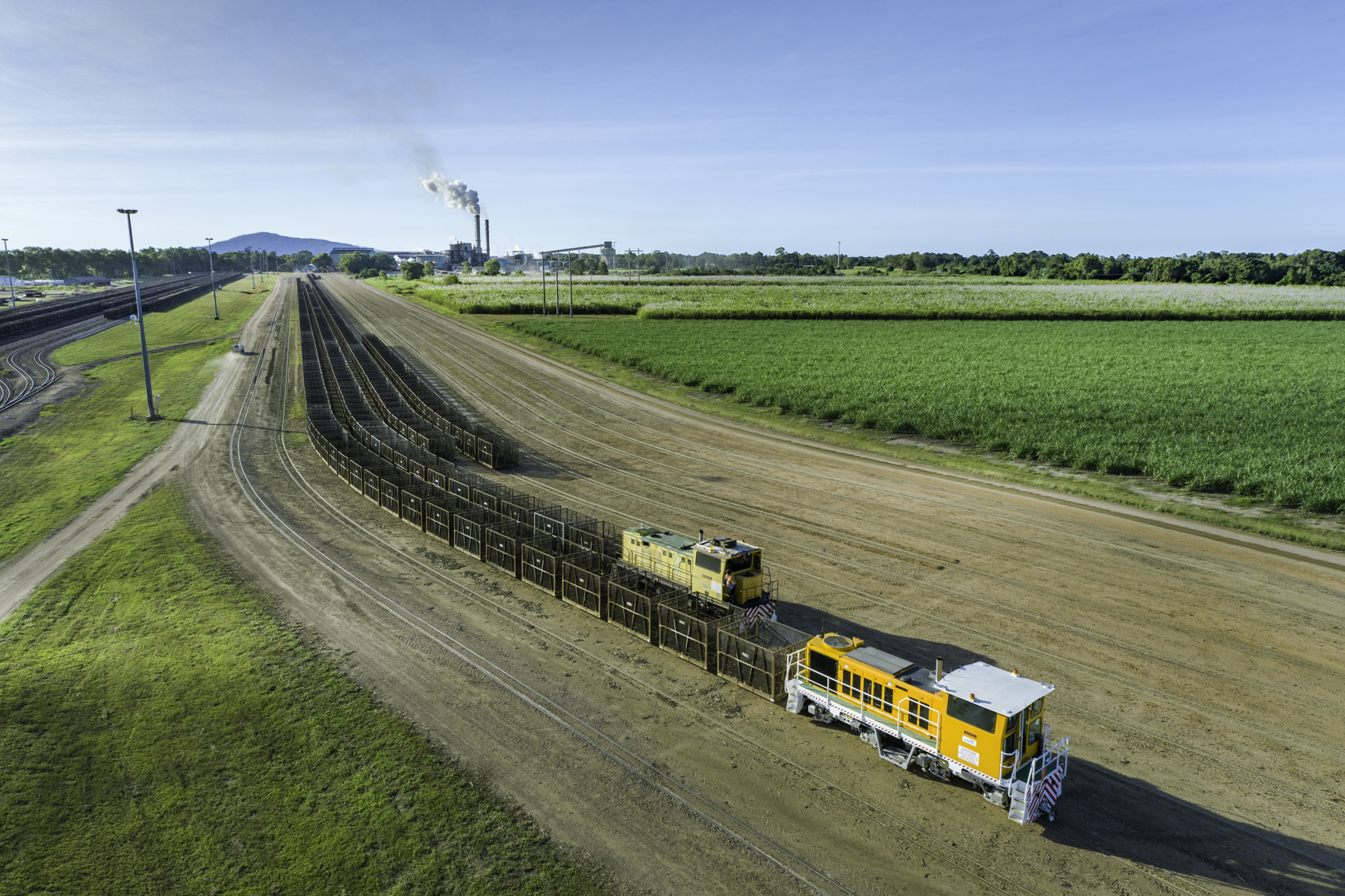
Wilmar Sugar and Renewables is concerned for the safety of its loco crews and members of the public after three track tampering incidents in the space of a week.
Burdekin Cane Supply Manager John Tait said members of the public had switched the points on three sections of cane rail line in the Burdekin region in the second week of the school holidays, causing two near hits and a derailment. One of the near hits involved children. It’s not known who was responsible for the other incidents.
“We’ve spoken with the parents of three children who were responsible for switching the points near Inkerman Mill in Home Hill on 9 July,” Mr Tait said.
“Fortunately, in that particular case, an outgoing loco driver saw the kids behaving suspiciously near the points and radioed it in.
“When our logistics officer went out to check, he found the points had been switched against the main line. This could have caused the cane train to veer into a cane rail siding on its way back into the mill, potentially colliding with cane bins and causing a derailment.
“While we were lucky on this occasion, I must emphasise how dangerous this sort of behaviour is. Tampering with the track is not a bit of harmless holiday fun – it can cause serious damage to our infrastructure and put our people’s lives at risk.”
Mr Tait said two similar incidents were also reported that week – one in the Invicta Mill area, near Giru, and one in the Kalamia Mill area, near Ayr. One of the drivers was able to pull up in time, avoiding a collision. The other cane train collided with bins on the siding, causing nine bins to derail.
“It’s fortunate that, in all three cases, the loco didn’t derail and no one was hurt. But all of these incidents could have resulted in serious injury or worse.
“Locos hauling cane bins can take up to a kilometre to come to a stop after brakes are applied. They typically travel at speeds of up to 35km an hour on main lines so it’s dangerous to suddenly divert them into a siding, where haulout operators pick up and drop off bins.”
Mr Tait appealed to parents and carers to warn children about the dangers of interfering with Wilmar’s cane rail infrastructure, or playing around cane rail lines.
“Children and other members of the public need to stay well clear of our cane rail network for their own safety and the safety of our loco crews.”
Wilmar Sugar and Renewables has issued a strong warning about the dangers of tampering
with its cane rail track following a spate of incidents in the Burdekin. Photo supplied: Wilmar Sugar and Renewables
A major derailment at Clare 2 siding caused significant disruption on the evening of Friday, 18 June 2025, when dozens of full cane bins came off the tracks as a loaded train entered the siding. The force of the derailment tore up sections of the main line, prompting a large-scale recovery effort. Crews worked through the night and into Saturday to clear the wreckage, with most of the damaged bins and track debris removed by 3pm on 19 June. The incident is one of the most serious derailments reported so far this crushing season. Photo credit: Carl Milne

The Queensland Government’s announcement to extend the 15 per cent rural irrigation price discount for another two years is a long-awaited and welcome move—and I reckon most of the farmers I know would say it’s about time.
This is a common-sense decision and one we’ve been calling for loud and clear.
It’s great to see the Crisafulli Government listening to what the agriculture sector has been saying and acting on it. For irrigators like us—especially in high-cost regions such as the Burdekin where I farm—this decision brings a bit of much-needed relief. Water and electricity costs are already through the roof, and they just keep climbing. Having this discount locked in will give growers some breathing room and help us keep water flowing onto crops instead of letting fields dry out because it’s too expensive to pump.
Many farmers have already made significant investments in more efficient irrigation systems to manage rising input costs. But when the price of water keeps going up, even the best systems won’t save a crop if growers can’t afford to use them.
In some areas, people are using less water just to save money, which then hits productivity hard. That’s not good for the farm, the industry, or our regional communities.
More than half of Queensland’s cane crop depends on irrigation, so getting the price settings right isn’t just important—it’s essential. This discount follows the Queensland Competition Authority’s advice and will be available across all 35 irrigation schemes in the state, which is good to see.
From 2025–26, farmers will need to apply to access the discount. It’ll only be available to certified owner-operated irrigating farm businesses, with the Queensland Rural and Industry Development Authority (QRIDA) handling the applications. If you’re not sure what you need to qualify, check the Business Queensland website. The scheme kicks off in September 2025, and if you’ve got questions, shoot an email to irrigationpricing@rdmw.qld.gov.au.
Let’s keep the water flowing and our farms growing.
CANEGROWERS Chair Owen Menkens says the extension of the irrigation discount is a welcome relief for growers battling high input costs. Photo supplied
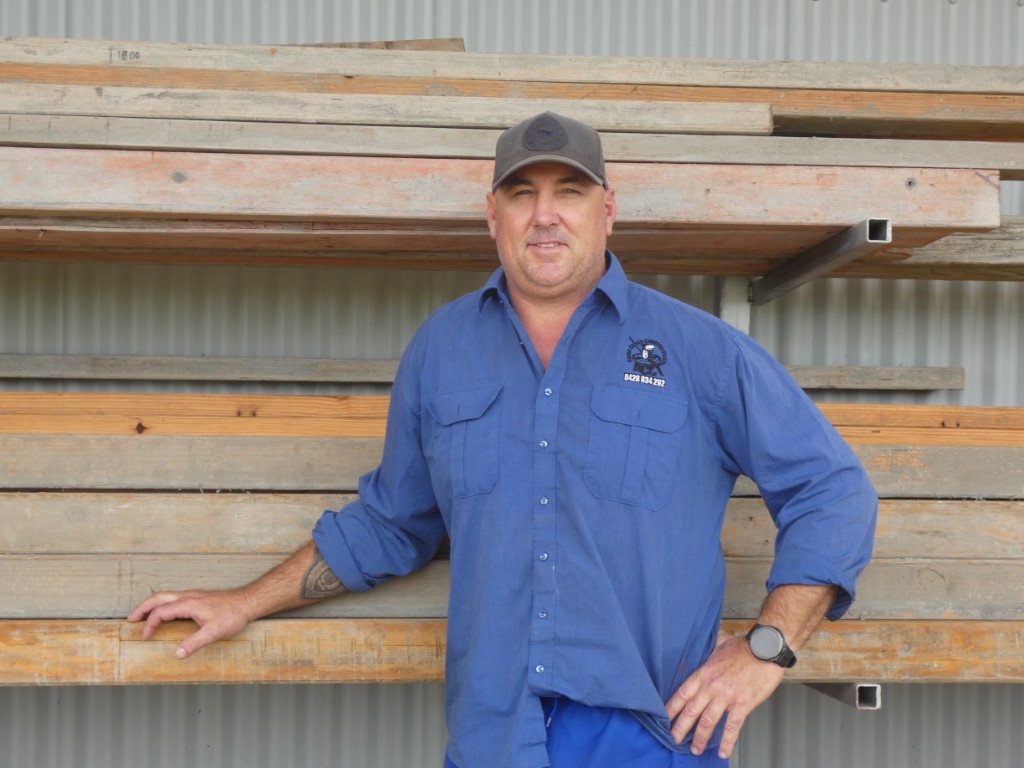
Local builder Aaron Cursio has never been afraid of hard work—or a new challenge. After more than two decades working for himself in the Burdekin, the hands-on tradesman is now branching into something he’s been eyeing for years: supplying and installing hot dipped galvanised structural steel sheds at very competitive pricing.
“It’s another opportunity to diversify and grow my business,” Aaron says. “I’ve been doing sheds for a long time, and now we can offer a superior shed at a more competitive price.”
Aaron has teamed up with a supplier, now offering large structural steel farm and machinery sheds at a cost that rivals the common kit options, while continuing to supply and install kit shed options for residential and commercial sectors.
“Structural steel sheds used to be very pricey, but now I’ve sourced a supplier that is cost-effective,” he says. “You’re getting a better-quality product that excels on strength and durability without paying through the nose.”
Born and bred in the Burdekin, Aaron started his apprenticeship in 1994. After eight years on the tools, he struck out on his own in 2002 and hasn’t looked back since.
“Sometimes you just gotta have a go,” he says. “It’s a lot of hard work, but you get out what you put in.”
Since then, he’s built a reputation across the region for quality concreting, renovations, and all manner of building work. His business is a family affair—his eldest son is now his apprentice—and he often works alongside other local builders and mates when big jobs call for it.
“You’ve gotta be a jack of all trades in a country town,” he says. “Here, you get to learn everything—from the footings right through to the fit-out. In the city, you’d just be doing one thing.”
The variety is part of what Aaron loves about the job, along with the camaraderie and easy-going attitude on the worksite.
“My motto’s always been: no one really wants to go to work, so you’ve got to make it fun,” he says.
Aaron says working for people in the Burdekin is rewarding in itself. “Our customers are friendly and happy-go-lucky. When they’re like that, you want to go above and beyond for them,” he says. “Sometimes just the little things make a big difference.”
Looking ahead, Aaron’s long-term plan is to grow the business to a point where it can support his dream of travelling around Australia—working job to job and seeing the country.
“For now, I’m just keen to see this new offering take off,” he says. “It’s a quality product and I think it’ll be a great fit for the Burdekin.”
Born and bred in the Burdekin, Aaron started his apprenticeship in 1994. Photo credit: Jacob Casha
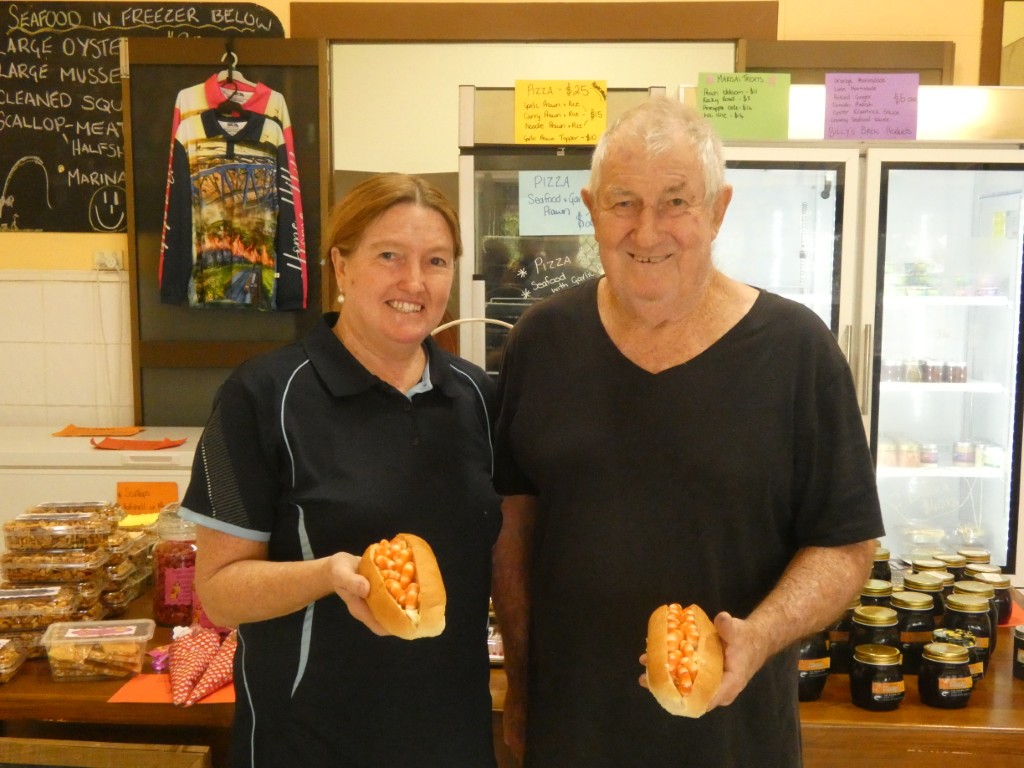
Home Hill’s The Prawn Shop has become a local seafood sensation—and it all started with four humble prawn rolls.
“We opened with just seafood, but to get people through the door, we started the prawn roll,” owner Melissa Wiles says. “On my first day, I made four. By the end of the week, I was making 40 a day.”
The prawn roll’s popularity skyrocketed, gaining even wider recognition after featuring on Channel 9’s Today Show. Melissa was contacted through the local council about the opportunity, where the roll was sampled live on air. Now affectionately dubbed “the famous prawn roll,” it has helped put Home Hill on the map for food lovers traveling through the region.
“It’s been really exciting,” Melissa says. “Since the TV show aired, business has definitely picked up. We’ve had more visitors, especially grey nomads passing through town.”
The Prawn Shop’s extensive menu includes crab rolls, lobster rolls, gluten-free options, and more. Beyond prepared meals, Melissa takes pride in sourcing local produce and seafood, supporting the Home Hill community wherever possible.
“We sell local honey from a young couple in town, onions from nearby farmers, and even support local schools with vouchers and fundraising merchandise,” Melissa explains. “It’s important to us to keep everything as local and fresh as we can.”
Melissa moved to the Burdekin region 22 years ago from Brisbane, drawn by the opportunities. After working for almost two decades in the seafood industry, she took the leap to open The Prawn Shop, filling a gap she saw in the local food scene.
Behind the scenes, Melissa’s partner Billy handles the cooking, often bringing in fresh catch from local trawlers, which they use to create the shop’s popular meals. They regularly restock depending on availability, keeping the menu vibrant and seasonal.
While the shop has grown steadily, Melissa is happy with its current pace and has no plans to expand aggressively. “We’re just plotting along, enjoying what we do,” she says. “Things are working, so why change it?”
Open seven days a week, The Prawn Shop has become a beloved fixture in Home Hill, serving as the go‑to pit stop for locals and visitors alike.
Home Hill’s The Prawn Shop has become a local seafood sensation—and it all started with four humble prawn rolls. Photo credit: Jacob Casha
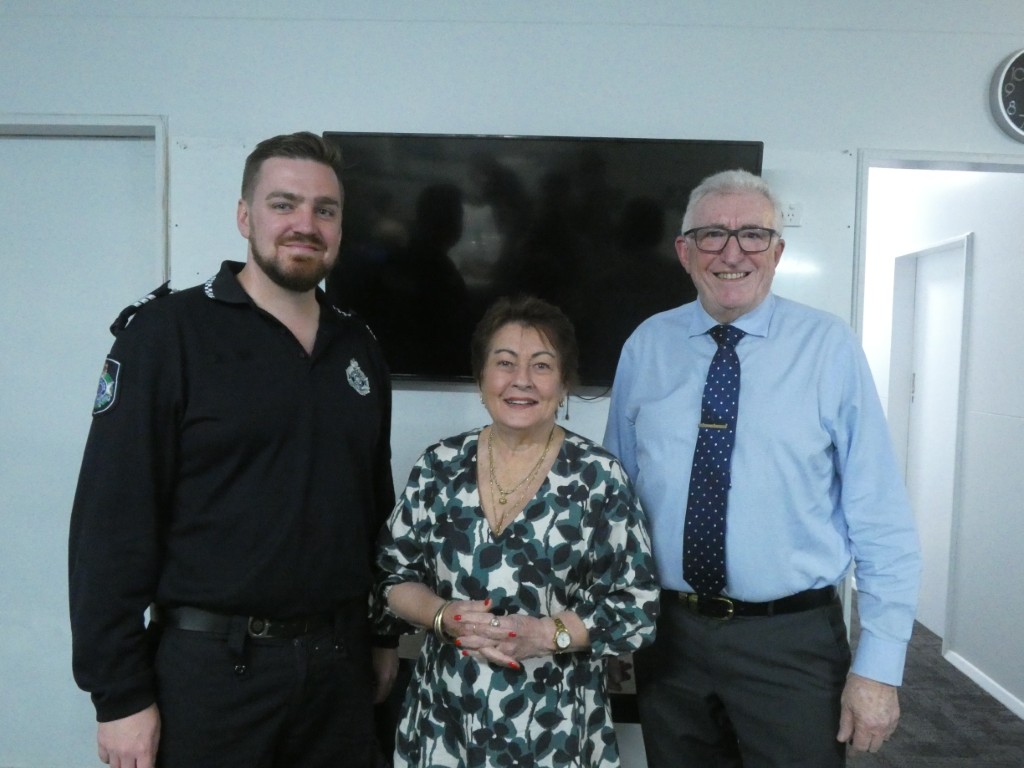
Wednesday's Home Hill Chamber of Commerce meeting was once again full of high spirits, local updates and passionate conversation.
The evening kicked off with Burdekin Shire Council Mayor Pierina Dalle Cort providing updates on council affairs, including funds being set aside to address the flying fox issue. She then fielded questions from the audience before handing over to officer Sam Pyke of Home Hill Police, who delivered a local crime update, highlighting the successful seizure of a sizeable quantity of drugs.
Burdekin Shire Council CEO and keynote speaker for the night, Matthew Magin, then captivated the audience with his storied journey, from apprentice butcher to leading one of North Queensland’s most dynamic regional councils.
As proceedings drew to a close, lively conversations continued as attendees stayed and mingled, rounding off another productive Home Hill Chamber meeting.
Officer Sam Pyke, Burdekin Shire Council Mayor Pierina Dalle Cort, and Burdekin Shire Council CEO Matthew Magin. Photo credit: Jacob Casha
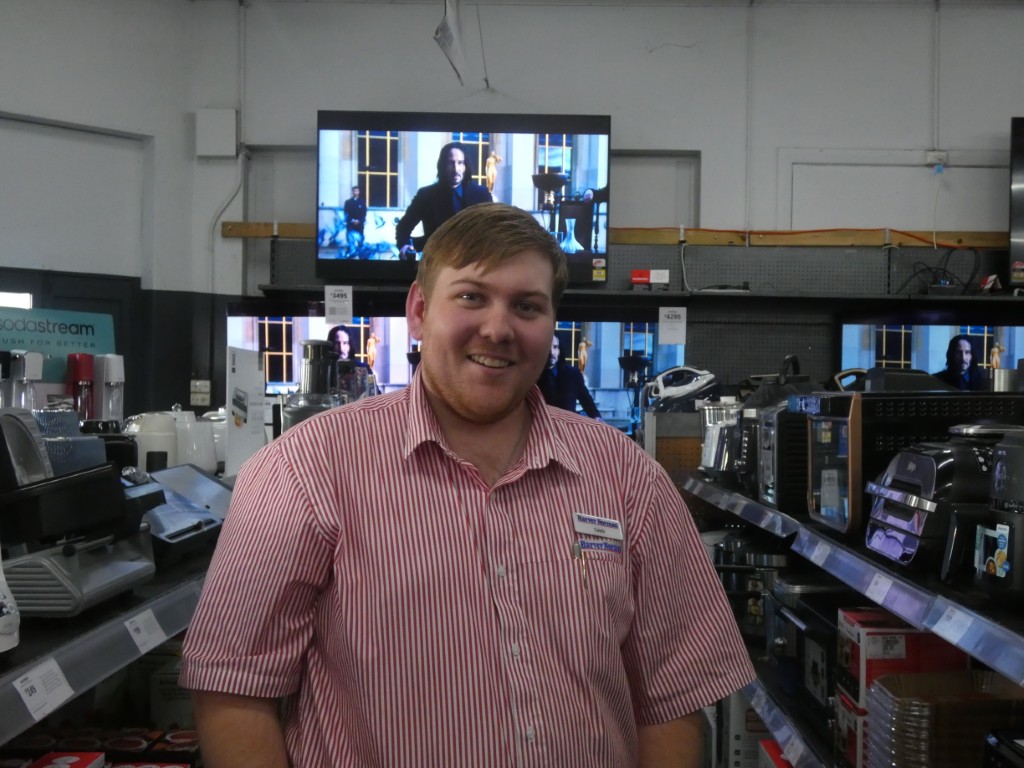
At just 22, Caleb Hill has already worked a string of jobs—from macadamia plantations to night-fill shifts at Woolworths—but it’s his current role in electrical sales at Harvey Norman Ayr that he calls “the only job I’ve fully enjoyed.”
“I’ve worked in a few different places,” Hill said. “I left school thinking, ‘Oh, I’ll find something to do.’ I worked on a farm, with Ford for a bit, did solar installation, and even night fill at Woolies. But this is genuinely the best thing I’ve done—I’ve actually enjoyed it.”
Hill joined Harvey Norman just over a year ago after spotting an ad online. “I always had the idea of going into sales, but I didn’t know how to start. There’s real estate, cars, all sorts of things. When I saw the job, I thought it might be a good step.”
Though he wasn’t a die-hard tech enthusiast growing up, Hill has found his niche in TVs and audio.
“I was a big gamer as a kid, but I’m not as into tech as some of the other guys here,” he said. “I do love colour, though—I love the TVs. Even just having customers come in and say, ‘I like watching action movies,’ and being able to show them a TV that’s going to blow them away, that’s the fun part.”
Outside of work, Hill describes himself as “funny, open-minded and curious.” Music is a big part of his life—both listening and playing. “I picked up guitar again recently, and I’m big into my music. I’ve been listening to a lot of DMA’s, Fleetwood Mac and Dire Straits.”
Born in Adelaide but raised in the Burdekin, Hill says the region’s sense of community is what makes his job special. “Everyone knows everyone here. You can have a chat with a customer buying a toaster and end up finding out they know someone you know. That doesn’t happen everywhere. It’s one of the best parts of the job!”
Born in Adelaide but raised in the Burdekin, Hill says the region’s sense of community is what makes his job special. Photo credit: Jacob Casha
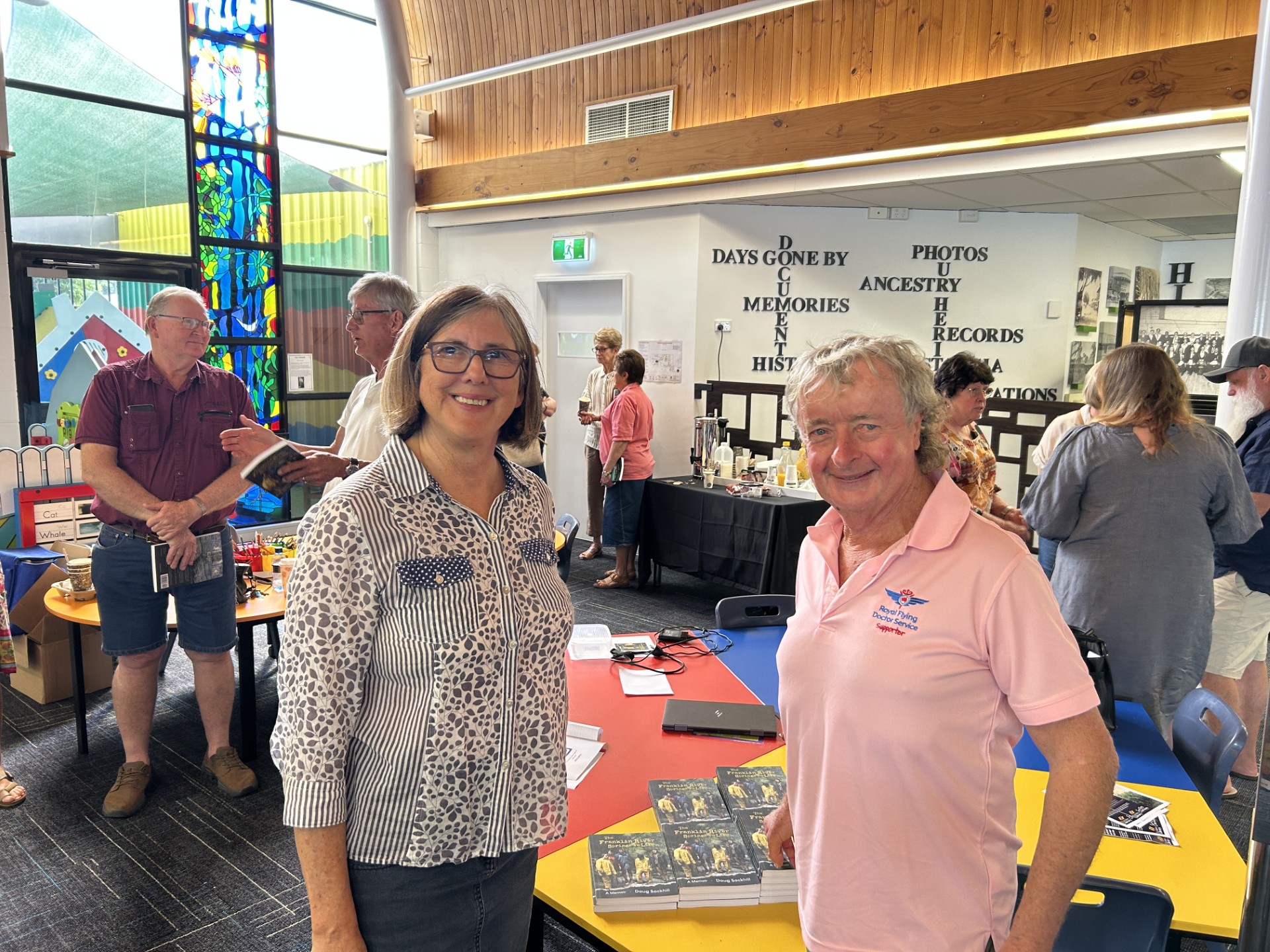
Burdekin Library hosted the launch of Doug Sockhill’s memoir on Saturday. Over thirty attendees enjoyed Doug’s stories and video presentations referencing his memoir, “The Franklin River Springs to Life”. Attendees also learnt the back story of the book, met Doug’s publisher, Belinda Walker, from Just Sparkle Books, and were entertained with stories from Doug’s long-term friend and Burdekin Mayor, Pierina Dalle Cort. Doug spent over 30 years in the Burdekin and has had an adventurous life both here and around the world.
Dougs’ book takes the reader on a gripping journey rafting down the iconic Franklin River in the world heritage area of wild southwest Tasmania. From bubbling mountain streams, through powerful rapids, to inspirational chasms rising from still waters with magical reflections.
A video photo merge displayed to the audience how fascinating this area really is. Doug also discussed why and how he wrote the book.
Readers will share Doug’s experiences and adventures, as he matches the tempo of the Franklin River with his life story. From low points of jails and courthouses in North Queensland to the highs of soaring through the French alps in a hang glider, to near-fatal experiences whilst diving and yachting off the Queensland coast near Ayr.
Doug’s adventures have shaped his character, from a creative, thrill-seeker living on the edge to a deep-thinking pragmatist.
Doug specifically mentioned that his story is identifying well with young adults and people nearing retirement. Readers are particularly enjoying the light-hearted approach in the book, together with some deeper thought-provoking and challenging commentary.
His memoir is available from Woods Newsagency, Home Hill News, Mary Who? Townsville, Amazon books (paper and e-book) and Booktopia.
Belinda Walker of Just Sparkle Books and author of “The Franklin River Springs to Life”, Doug Sockhill. Photo supplied
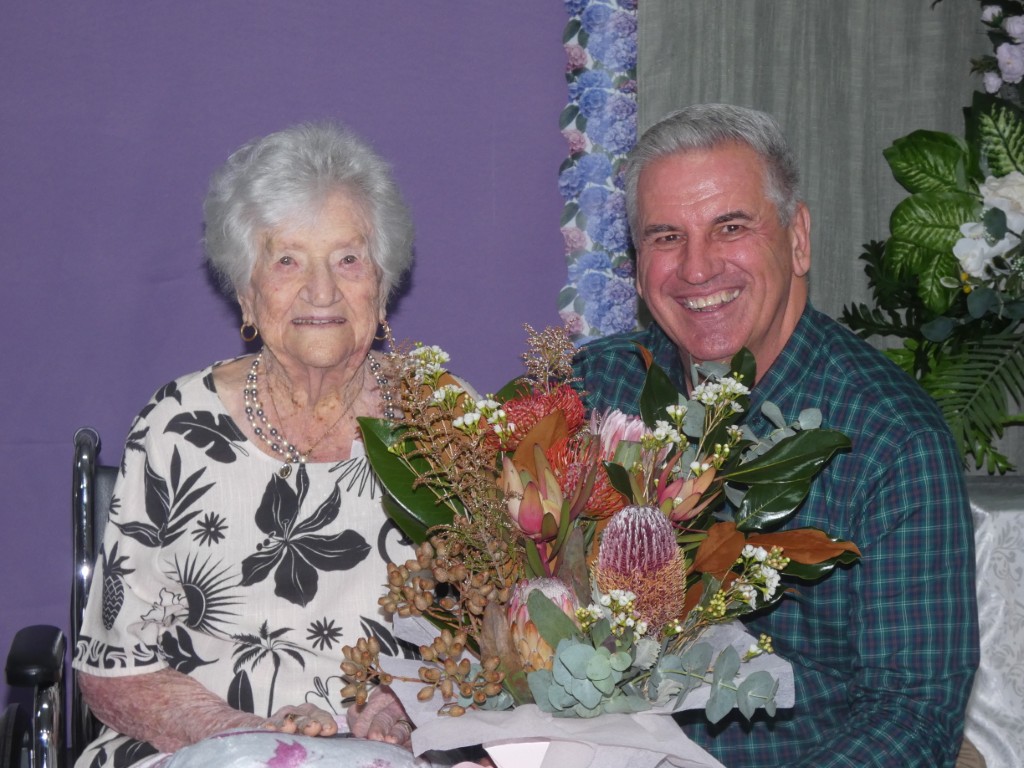
The community gathered at Regis Aged Care Home, Ayr, on Wednesday, 9 July to celebrate 100 years of beloved Burdekinite Violet “Vi” Liebrecht.
The event welcomed family, friends, and familiar faces from across the region, who were greeted by a vibrant, elegant, and warmly decorated hall.
Among attendees was Member for Burdekin, Dale Last MP, who was especially proud to celebrate the milestone with Vi.
“Vi is one of our pioneers, and has contributed so much to the Burdekin community,” said Mr Last. “What a great milestone, and what a great day for Violet and her family.”
A Century of Resilience, Care, and Style
“Stoic,” said daughter, Rhonda Sinclair, without much hesitation when asked to describe Vi.
Vi was born in 1925 in Murgon to German settlers Paul and Louisa Holznagel. Raised on a dairy farm alongside 10 siblings, she learnt from a young age the meaning of discipline, resilience and hard work.
“There was no time for any precious moments. It was all about working together and getting the job done,” says Rhonda.
“You supported your siblings... you went to Sunday school. You walked to school… It was very much a healthy lifestyle, of its time,” she added.
These early years shaped Vi into a woman who understood the value of sacrifice and community—values that heavily influenced Vi’s decision to enlist in the Women’s Auxiliary Air Force (WAAF) at just 18 years old, amidst the turbulence of World War II. Stationed in Townsville, she found a connection to the north that would forever influence her future.
Returning from service, Vi spent some time in Brisbane before settling in the Burdekin region, marrying Emil Liebrecht and raising five children, including twins. Despite the harsh demands of mid-20th century sugarcane farming in Queensland, she managed it all with great aplomb.
“If needed Mum would put a pair of overalls on and drive the truck beside the harvester, go back up and make coffee or morning and afternoon tea, as they would—then, maybe the next evening put on her very best dress and jewellery and go to a function,” said Rhonda.
She cultivated this love for fashion during her time tailoring mens clothing down south—a love that she passed on to her children.
“She loved dressing up and encouraged us girls to take pride in our appearance,” Rhonda recalls. “There was always fabric around the house, and Mum taught us about deportment— an appreciation for the nicer things in life.”
As a mother, she fostered a no-fuss household environment of confidence and self-respect. Education was encouraged, appearances were valued, and discipline was delivered with purpose. “There wasn’t a lot of warm and fuzzy,” Rhonda says. “But we were always encouraged. If you did something well, it was a shared joy—and you felt it.”
She stayed active in the community through the CWA, church and RSL women’s auxiliary, and with her son Gary’s encouragement, proudly marched in VP commemorations in later life.
Even after losing her husband Emil and later her son Jeff, Vi carried on with the same resilience that had defined her life. Now, at 100, her mind remains sharp and observant, with her spirit content.
“Granny—that’s what we all seem to call her now, and I think that’s where her legacy really lies,” Rhonda reflects. “Not just for me, but for her children, grandchildren, and great-grandchildren. They’re just beginning to understand who she was and what she lived through. And I think they’ll look back and recognise it.”
Violet “Vi” Liebrecht celebrated her 100th birthday with friends, family and a special visit from Member for Burdekin Dale Last. Photo credit: Jacob Casha